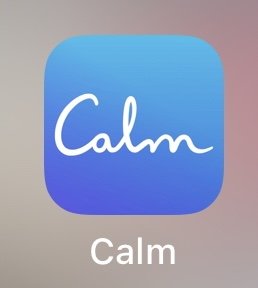It’s been pointed out to me that I’m guilty of discounting the positive and focusing on the negative. Just one of the many thought distortions I’m guilty of.
I’ve been trying to break that bond by changing where I put my attention. When it comes to rewiring the brain, it is a lot easier said than done. I’ve heard a lot of “just be happy”, “don’t be sad”, “just don’t think about it” but unfortunately my trauma, depression and anxiety won’t just magically go away. It’s frustrating to not have control over my intrusive thoughts. It takes conscious effort to challenge these thoughts and it can be exhausting.
My coping strategies
I find the following coping skills and self care practices have really helped me in this particular situation. I have been using the Calm App to help train and rewire my brain so I can change where I put my attention.
Before bed I complete the following “check-ins”:
What are you grateful for? This doesn’t have to be a long list, 1-3 things is sufficient so it doesn’t get too overwhelming. Some gratitude prompts could be:
What are you grateful for today?
What about today has been better than yesterday?
What’s something you’re looking forward to in the future?
What inspired you today?
What relationships are you thankful for today?
Daily reflection - some reflection prompts can be:
Which difficult emotion can you take some time to sit with today?
Do you limit yourself by caring about what others think of you?
Describe a time when you felt peaceful
Where in life do you want to develop more equanimity? Why?
What habits do you want to make or break?
There are many other gratitude and daily reflection prompts that can be found through our friend, Google, to help start this routine. I find it helps to have these questions to make me think and change my focus.
It’s not easy to re-wire the brain and I have been struggling with my mental health for a long time now and I find it really difficult at times to even think of one thing I’m grateful for. One of the many symptoms of my diagnosis is catastrophizing, meaning I always go to the worst case scenario. I also have a tendency to discount the positive and only focus on the negatives.
By “checking-in” I can challenge these negative intrusive thoughts. I will instead remember all the positive things in my life and all the things I should be grateful for. Depending on where we put our attention, we could be prolonging our suffering. I know it’s easier said than done, I am still working on this too. When I ruminate about my trauma or worry about things that are out of my control, it leads to more anxiety and panic attacks. This daily reflection and gratitude practice helps change where I put my attention and focus on the good.
Like all coping tools, this too will take practice and time. As I have been reminded time and time again, practicing these coping strategies is similar to working out in the gym. The more we do it, the stronger we will get.
I have experienced first hand that this healing process is not linear, there will still be dark periods and back sliding at times. Please be kind to yourself during those moments and don’t give up. There are many resources online, health care professionals, and groups available to help. Take it one day at a time, you are a warrior for fighting though this and it will get better. I hope my recovery journey helps provide some coping tools and let you know that you are not alone. There is strength in reaching out for help.

